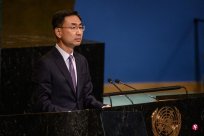(Canberra Comprehensive News) Former Australian Prime Minister Ki Ting described China as one of the countries that have a "huge influence" in the world, and said that the world's most advanced economy (G7) should be included in China.
Comprehensive Australian News and Australian Sky News reported, Katana said in a public lecture on Wednesday (12th) in a public lecture on La Trobe University that in the next 30 years, every place around the world will beThe huge influence of China, and China can bring stability to the world like in Asia.
From 1991 to 1996, Ki Ting, who served as Prime Minister in the Australian Labor government, also criticized the current multilateral security arrangement of the Australian government and Western countries, such as the "Quad) and the" Quartet Safety Dialogue "(QUAD) and the United States, Japan, and Australia.AUKUS.
He does not deny that the QUAD dominated by the United States is "strategic nonsense", saying that Australia should not be associated with other countries to try to curb China.He also called on Australia to withdraw from Aukus and warned that if the Labor government led by the current Prime Minister Albanis continues to promote this cooperative relationship, "it will be a tragedy for Australia."
Although the era of the "hegemony" of the United States as a global superpowers has passed, he believes that China and the United States can work together to manage the world together; the United States can consolidate the Atlantic region including Russia to Europe, and China can play in the East as the East.The same role.
Kya added: "I think this model is beneficial to the world, because the Chinese have not tried to overthrow the existing system. We must figure out that China is not the former Soviet Union and has not exported ideology."
Australian security experts criticize Katin's disconnection on security issues
Keine Ting's remarks caused controversy in Australia. Some Australian security experts criticized him to be disconnected on security issues and destroyed his foreign policy heritage.


